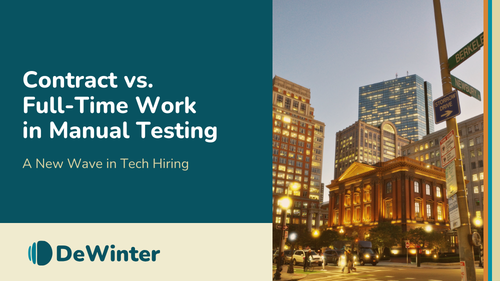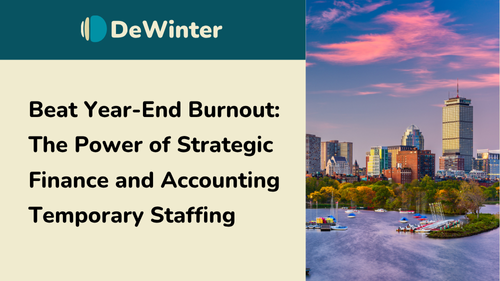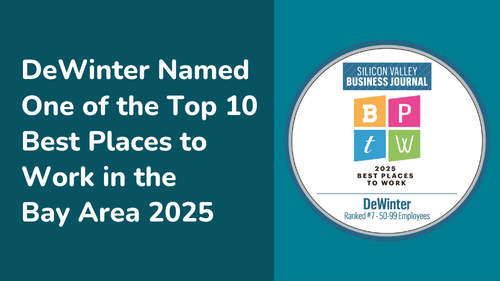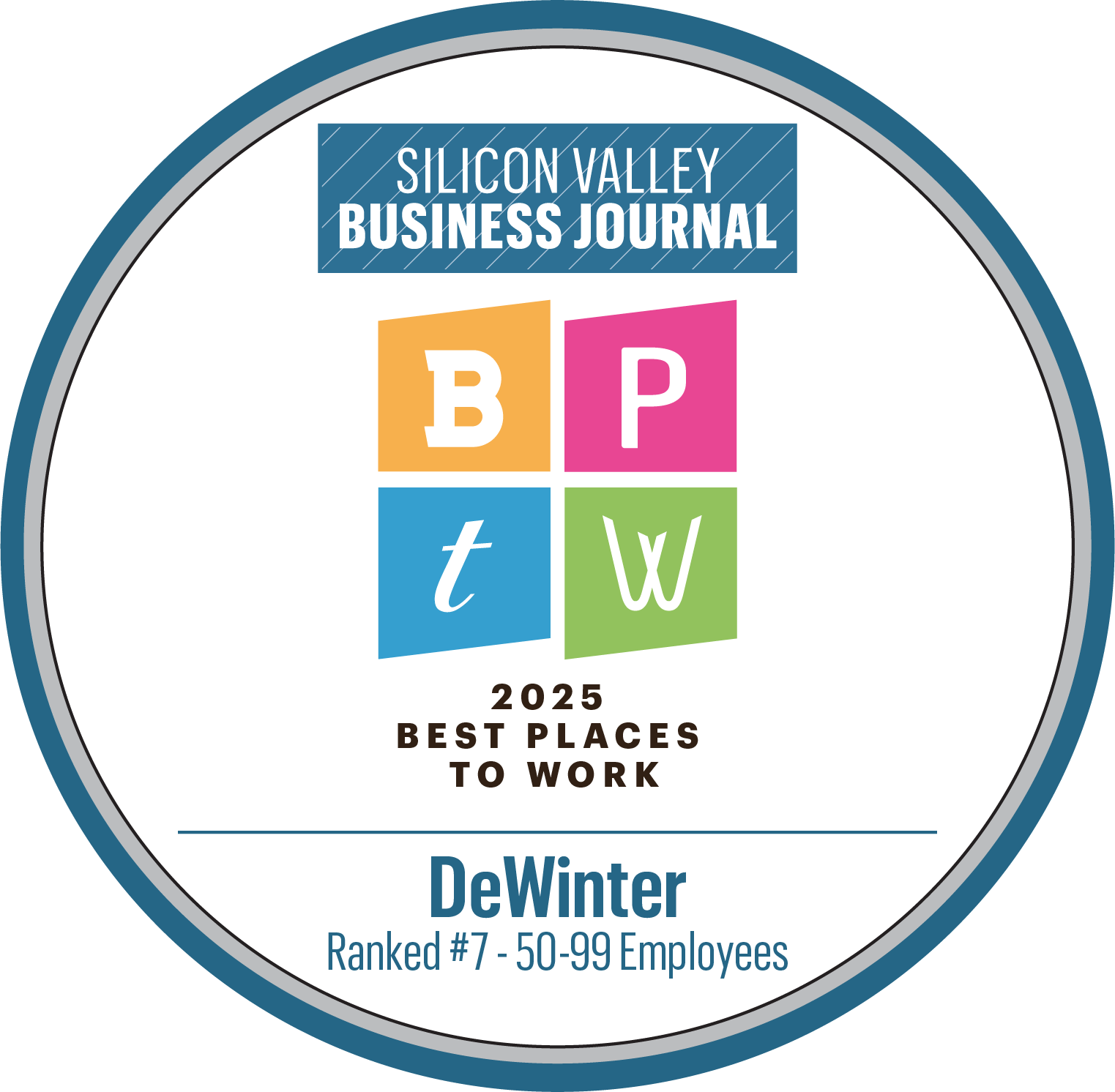A Practical Guide to Interviewing Finance & Accounting Talent in the Bay Area

In the competitive landscape of the Bay Area, securing top finance and accounting talent or landing your dream role within the industry demands more than just a resume and a standard Q&A. It really boils down to understanding what makes people excel in these crucial areas: being great with the technical stuff, communicating clearly, and having a sharp business mind.
This guide provides a roadmap for both hiring managers and job seekers, outlining the most effective interview questions that can help you identify the finance talent that can best support your team.
For Hiring Managers: Securing the Right Fit
When interviewing candidates for finance and accounting roles, your goal isn't just to verify technical skills; it's to assess their critical thinking, problem-solving abilities, and how they contribute to strategic decision-making.
At DeWinter we make a conscious effort to secure the right fit for your team by asking the right questions. Provided in this article are four key questions that some of our recruiters use, categorized by role, along with strong answers that you should look for in a candidate:
1. Accounting Roles (Staff Accountant, Senior Accountant, Accounting Manager)
Accounting professionals are the bedrock of any business, demanding precision and the ability to adhere to ever-changing standards.
Question: "Walk me through the process of preparing a month-end close for a growing tech company. What are the common challenges you've faced and how did you overcome them?"
- What to look for: A strong answer will detail the steps (e.g., reconciliations, journal entries, variance analysis), demonstrate knowledge of relevant accounting software (e.g., NetSuite, QuickBooks, SAP), and highlight proactive problem-solving. They might discuss automating processes, improving data integrity, or collaborating with other departments to resolve discrepancies. This reveals technical knowledge and practical application.
Question: "Describe a time you identified a significant accounting error. What was your process for investigating it, correcting it, and preventing future occurrences?"
- What to look for: The candidate should outline a structured approach: initial discovery, root cause analysis, corrective actions (e.g., adjusting entries), and preventative measures (e.g., implementing new controls, training staff). This showcases attention to detail, problem-solving, and integrity.
Question: "How do you stay updated on changes in accounting standards (GAAP/IFRS) and tax regulations?"
- What to look for: Evidence of continuous learning through professional organizations, industry publications, webinars, or certifications (e.g., CPA). This demonstrates a commitment to professional development and compliance.
2. FP&A Roles (Financial Analyst, Senior FP&A Analyst, FP&A Manager)
FP&A professionals are the strategic partners, translating financial data into actionable insights that guide business decisions. For those working in major cities like San Francisco, this figure sees a significant jump, with Financial Analysts making an average of $183,792, a substantial 72% above the national average Financial Analyst salary of $106,892. Highlighting the premium placed on FP&A expertise, especially in high-cost, innovation-driven markets like the Bay Area.
Question: "Imagine our company is considering a new product launch. How would you go about building a financial model to assess its viability, including revenue projections, cost analysis, and profitability?"
- What to look for: A detailed explanation of financial modeling principles (e.g., drivers, assumptions, sensitivity analysis, scenario planning), showcasing proficiency in Excel and financial forecasting software. They should articulate how they'd work with sales, marketing, and operations to gather data and validate assumptions. This demonstrates strong technical modeling skills, business acumen, and cross-functional collaboration.
Question: "Describe a situation where your financial analysis directly influenced a key business decision. What was the challenge, your recommendation, and the ultimate outcome?"
- What to look for: A clear narrative using the STAR method (Situation, Task, Action, Result). The candidate should emphasize the impact of their analysis, demonstrating how they translated complex financial data into understandable insights for non-finance stakeholders. Highlighting strong communication skills and a drive for real impact through with their analysis.
Question: "How do you handle situations where actual results significantly deviate from your forecasts? What's your process for variance analysis and communicating these insights?"
- What to look for: A robust approach to identifying the root causes of variances (e.g., market shifts, operational inefficiencies), the ability to explain complex financial concepts clearly, and the confidence to present potentially challenging news while offering solutions. The candidate should show analytical thinking, communication, and proactive problem-solving.
3. Auditing Roles (Internal Auditor, IT Auditor, Audit Manager)
Auditors provide assurance and improve operational efficiency by evaluating controls and processes.
Question: "Explain the importance of internal controls. Can you describe a specific example where you identified a weakness in internal controls and recommended improvements?"
- What to look for: A strong understanding of control objectives (e.g., safeguarding assets, ensuring data accuracy). The candidate should detail a specific control deficiency, their assessment of its risk, and the practical, actionable recommendations they made to strengthen the control environment. Demonstrating technical knowledge of controls, risk assessment, and problem-solving.
Question: "How do you approach a challenging conversation with a department head who is resistant to your audit findings or recommendations?"
- What to look for: Evidence of strong interpersonal and negotiation skills. The candidate should describe a diplomatic approach, focusing on collaboration and the mutual benefits of implementing recommendations rather than an adversarial stance. Above all, the candidate should emphasize strong communication skills and fortitude.
Question: "How do you stay current with evolving regulatory requirements and industry best practices in auditing?"
- What to look for: Continuous professional education (CPE), certifications (e.g., CIA, CISA), participation in professional forums, and a proactive attitude towards learning. This indicates a commitment to professionalism and compliance.
4. Finance Leadership Roles (Controller, CFO, Director of Finance)
Leaders in finance are not just technical experts; they are strategic visionaries, team builders, and effective communicators.
Question: "Describe your leadership style. How do you motivate and develop your finance team to achieve strategic objectives?"
- What to look for: Specific examples of leadership in action, demonstrating empathy, mentorship, and a results-oriented approach. They should discuss delegation, performance management, and fostering a collaborative team environment. The candidate should exemplify their leadership capabilities and a commitment to team development.
Question: "How do you contribute to the overall business strategy as a finance leader? Provide a specific example of how you've partnered with other C-suite executives."
- What to look for: A clear articulation of their role beyond traditional finance, showcasing their ability to understand and influence broader business goals. They should provide concrete examples of strategic initiatives they've supported or led, demonstrating business acumen and executive presence.
Question: "What are the biggest financial challenges facing companies in the Bay Area today, and how would you advise our organization to navigate them?"
- What to look for: A well-researched answer that reflects an understanding of economic trends, industry-specific challenges (e.g., valuation fluctuations, talent acquisition costs), and potential solutions. This demonstrates strategic thinking, market awareness, and proactive problem-solving.
The Rise of AI in Finance & Accounting: A Key Trend
It's crucial to acknowledge the evolving role of technology in finance. Artificial intelligence (AI) is rapidly transforming the industry, automating routine tasks and enabling deeper insights. According to a recent study, 59% of accountants across the US and UK report that they are already using AI-based tools and applications to save an average of 30 hours of work per week across their teams. For hiring managers, this means seeking candidates who are not only comfortable with, but also eager to leverage, new technologies.
By approaching the interview process with a strategic mindset, hiring managers in the Bay Area's dynamic finance and accounting sector can significantly increase their chances of finding the perfect fit. It's about looking beyond the resume and truly understanding the depth of talent, communication capabilities, and business insight that drives financial success.















